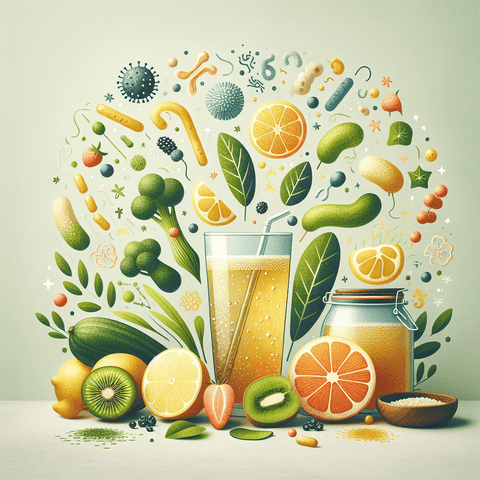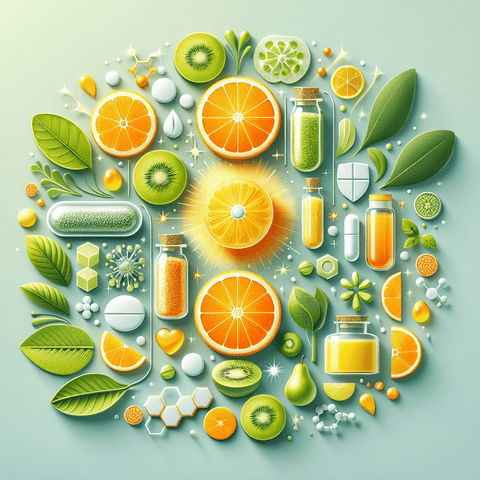Introduction to Probiotics and Their Importance in Nutrition
Probiotics are live microorganisms, often referred to as "good" or "friendly" bacteria, which confer a health benefit to the host when consumed in adequate amounts. These beneficial microbes are primarily known for their role in supporting a healthy gastrointestinal (GI) tract and aiding digestion. The human gut houses trillions of microbes that contribute to metabolic processes, immune responses, and even mood regulation through the gut-brain axis. With growing scientific evidence supporting the link between gut microbiota and overall health, probiotics have become a central topic in nutritional science. In recent years, there's been a significant increase in the availability and popularity of probiotic supplements, including capsules, powders, and functional drinks. Consumers are increasingly looking for natural and effective ways to improve their digestive health without relying heavily on synthetic medications. Probiotic-rich beverages have emerged as a flavorful and convenient option, combining hydration and nutrition with gut wellness benefits. This blog post aims to explore the best probiotic drinks available, evaluate their health benefits, and provide guidance on how you can incorporate these beverages into your daily routine. Whether you're new to probiotics or looking to diversify your current regimen, you'll find insights into choosing the right drink to support digestion, boost immunity, and enhance overall well-being.Probiotics Drink: A Key Nutritional Supplement for Gut Wellness
A probiotics drink is a beverage that contains live cultures of beneficial bacteria and sometimes yeasts, which, when consumed, help improve or restore the gut flora. These drinks fall under the broader category of functional foods and beverages, which are consumed primarily for their health-promoting properties rather than just their nutritional value. Unlike probiotic pills or powders, probiotic drinks offer a more bioavailable and enjoyable method of intake. The fermentation process often involved in creating these drinks produces a beverage rich in enzymes, vitamins, and taste. Furthermore, these drinks can be an excellent source of hydration and sometimes include prebiotic fibers—the “food” that fuels probiotic organisms. Probiotic drinks also stand out because they are regularly consumed, easily integrated into meals, and can be tailored with other healthy ingredients such as fruits, herbs, or additional supplements. Since the probiotic content can vary widely between brands and preparation methods, choosing the right beverages for optimal health impact is essential. Key factors to look at include: - Type and diversity of probiotic strains: Not all strains have the same effect; for instance, Lactobacillus and Bifidobacterium species are widely documented for gut health. - Colony Forming Units (CFUs): The measurement of live microbes. A good probiotic drink should offer at least 1 billion CFUs per serving. - Added sugars and preservatives: Go for options with minimal added sweeteners and clean labels. - Functional additives: Ingredients like fiber, ginger, turmeric, or omega-3 fatty acids can enhance the effects. In conclusion, choosing the right probiotic drink as a nutritional supplement can lead to more significant health benefits. These benefits are amplified when paired with vitamins and minerals essential for digestion and immune function such as magnesium and omega-3s, which are also available from the [Topvitamine magnesium collection](https://www.topvitamine.com/collections/magnesium-benefits-energy-muscle-bone-support) and [omega-3 DHA/EPA supplements](https://www.topvitamine.com/collections/dha-epa-omega-3-supplements).Fermented Beverages: A Natural Source of Probiotics
Fermented beverages are traditional drinks made through microbial fermentation processes that convert sugars and starches into alcohol or acids, preserving the drink and enriching it with probiotics. These natural and time-honored drinks offer a powerful way to support gut health. Here are some notable fermented beverages that are naturally rich in probiotics: 1. Kefir: Kefir is a fermented milk drink made using kefir grains that contain bacteria and yeast. Unlike yogurt, which typically contains only a few types of bacteria, kefir contains up to 30 strains, making it a highly diverse source of probiotics. It is rich in calcium, B vitamins, and bioactive peptides, and is often better tolerated by lactose-intolerant people due to the fermentation process. 2. Kombucha: Originating from East Asia, kombucha is a fermented tea made with sugar, black or green tea, and a symbiotic culture of bacteria and yeast (SCOBY). The result is a lightly effervescent drink rich in acetic acid, polyphenols, and a range of probiotics like Gluconacetobacter and Lactobacillus. Kombucha also offers antioxidant effects thanks to tea-derived compounds. 3. Traditional Fermentations: Drinks like kvass (Slavic fermented rye beverage), chicha (Latin American maize fermentation), and boza (Turkish grain-based drink) are rarely found commercially but can be made at home. These contain naturally occurring lactic acid bacteria which promote gut health. Hydration with fermented drinks enhances not just gut flora but also supports the absorption of critical nutrients such as vitamins D and K, which work synergistically with probiotics. Intake of these vitamins in tandem may be complemented through [vitamin D supplements](https://www.topvitamine.com/collections/vitamin-d-benefits-sources-safety) and [vitamin K products](https://www.topvitamine.com/collections/vitamin-k-benefits-bone-blood-health) available. When selecting a fermented probiotic beverage: - Avoid overly sugary commercial options. - Choose beverages that indicate the presence and strain of live cultures. - Look for cold-chain storage products that guarantee bacterial integrity. Incorporating these fermented drinks is a tasty and efficient way to improve your probiotic intake while complementing your nutritional menu with natural enzymes, beneficial flora, and additional micronutrients.Probiotic Smoothie Options: Delicious and Nutritious Ways to Boost Gut Health
Probiotic smoothies represent a modern, customizable, and delicious way to consume probiotics while also benefiting from the phytonutrients and fiber present in fruits and vegetables. These smoothies are created by blending probiotic-rich bases like kefir or yogurt with ingredients such as fruits, leafy greens, seeds, and superfoods to make a meal-worthy beverage. Benefits of Probiotic Smoothies: - Enhanced Nutrient Absorption: Many micronutrients, including vitamins A, D, E, and K, are fat-soluble and better absorbed when combined with fats and probiotics. - Prebiotic Synergy: Ingredients like bananas, oats, apple skins, and flax seeds provide prebiotics that feed and strengthen the probiotic cultures. - Convenience: Easy to prepare and perfect for breakfast or a snack. - Palatability: A great way for those who dislike the taste of fermented products to get probiotics. Recipe Ideas: 1. **Berry-Kefir Smoothie** - 1 cup unsweetened kefir - ½ cup mixed frozen berries - 1 tablespoon ground flax seeds - 1 tablespoon honey - Blend & enjoy. 2. **Green Gut Smoothie** - 1 cup spinach - 1 cup plain yogurt - 1 sliced banana - ¼ avocado - ½ cup water or almond milk Suggested Probiotic Strains for Smoothies: - Lactobacillus acidophilus - Bifidobacterium lactis - Lactobacillus rhamnosus GG These strains are often included in drinks for their established GI benefits and are also present in many fermented dairy bases. You can amplify the nutrient value and gut support of these smoothies by integrating [vitamin C-rich products](https://www.topvitamine.com/collections/vitamin-c-benefits-immunity-antioxidant-energy). Vitamin C supports immune function and acts as a powerful antioxidant, working synergistically with healthy bacteria in restoring gut balance.Gut Health Drinks: Focused Formulations for Digestive Wellbeing
Beyond fermented beverages, the evolution of nutritional science has introduced functional gut health drinks. These are specially formulated to pack therapeutic doses of probiotics, prebiotics, digestive enzymes, and even adaptogens into convenient beverage forms. Unlike traditional products, these drinks: - Use targeted probiotic strains depending on the health goals (e.g., Bifidobacterium infantis for IBS, Saccharomyces boulardii for traveler’s diarrhea). - Pair probiotics with prebiotics and fiber (such as inulin or FOS) to fuel probiotic growth within the gut. - Often include ingredients aimed at reducing inflammation (e.g. turmeric) and improving mucosal linings (e.g. aloe vera). Commercial vs. Homemade Options: - Commercially available drinks: Offer standardized doses, research-backed strains, and shelf-stability. Look for brands with transparent labeling, low/no sugar content, and CFU counts that meet your health goals. - Homemade drinks: Provide lots of personalization and freshness but may vary in probiotic content and require careful sanitation to avoid contamination. This balance of efficacy and personalization makes gut health drinks a powerful tool in digestive wellness protocols. They’re best consumed as part of a broader wellness regimen that includes balanced nutrition, sufficient physical activity, and complementary supplementation like magnesium, available through the dedicated [magnesium supplement range](https://www.topvitamine.com/collections/magnesium-benefits-energy-muscle-bone-support), known to support normal muscle function and reduce tiredness — crucial for supporting active gut function.Probiotic Beverage Recipes: DIY Ideas to Customize Your Probiotic Intake
Creating probiotic drinks at home is a satisfying and resourceful way to manage your gut health while tailoring flavors and ingredients to your preferences. Here are several DIY recipes you can try, each offering a probiotic punch with added functional benefits. 1. Homemade Kombucha: Ingredients: - 1 SCOBY - 1 cup starter tea (from a previous batch or store-bought raw kombucha) - 4 cups filtered water - 4 black or green tea bags - 1/3 cup sugar Instructions: 1. Brew the tea and dissolve the sugar. 2. When cooled, add SCOBY and starter tea. 3. Ferment for 7-10 days in a glass jar at room temperature. 4. Flavor (optional) with ginger, fruit juice, or herbs; ferment an additional 2-3 days. 5. Refrigerate and consume within 2 weeks. 2. Fermented Ginger Ale: - 2 inches grated ginger root - 1/4 cup sugar - Juice of 1 lemon - 1/2 cup whey (from yogurt or kefir) - 4 cups water Let ferment in sealed jars for 3 days at room temperature, then move to the fridge. Tips for Safe Fermentation: - Always use sterilized jars and utensils. - Store in cool dark areas during fermentation and refrigerate after. - Taste test regularly for signs of off odors or mold and discard if abnormal. Flavor Enhancements: - Berries, mint, citrus peels, turmeric root. - Combine with fruit extracts or infused oils high in antioxidants. These DIY beverages give full control over what goes into your diet—no hidden sugars or preservatives. They also offer an excellent foundation to complement your daily supplement regimen including essential fatty acids and bone-building vitamins found in the [Topvitamine supplement categories](https://www.topvitamine.com/collections/dha-epa-omega-3-supplements).Probiotic Drink Benefits: Why Choosing the Right Beverage Matters
The full spectrum of probiotic beverage benefits is broad and far-reaching. Beyond aiding digestion, these drinks play a role in multiple health aspects thanks to their effect on the gut microbiota. 1. Digestive Optimization: Probiotics help break down food compounds like lactose and fiber, reducing bloating, gas, and discomfort. They also support the integrity of the gut lining and increase the production of beneficial metabolites like short-chain fatty acids. 2. Immune Function: A significant proportion of immune cells reside in the gut-associated lymphoid tissue (GALT), making gut health crucial for immune surveillance. Regular probiotic intake has been associated with fewer upper respiratory infections and improved response to pathogens. 3. Gut-Brain Axis: Emerging evidence suggests that probiotics influence mental health by producing neurochemicals and modulating inflammation. Certain strains like Lactobacillus helveticus and Bifidobacterium longum have shown anxiolytic effects. 4. Microbiota Balance: Modern diets often lead to dysbiosis—an imbalance in gut flora. Probiotics crowd out harmful bacteria, normalize stool frequency, and can prevent antibiotic-associated diarrhea. 5. Long-Term Health Outcomes: Chronic inflammation, associated with metabolic diseases, autoimmune disorders, and even cognitive decline, may be mitigated through improved gut health via probiotics. Choosing the right drink ensures you're consuming strains and compounds that will provide real, EFSA-compliant benefits. Avoid sugary or overly processed products and integrate probiotic drinks regularly, in combination with a nutrient-rich diet that includes synergistic supplements such as vitamin D and omega-3.Selecting the Best Probiotic Drink for Your Needs
Choosing the right probiotic drink depends on several factors tailored to your health needs and preferences: 1. Probiotic Strains: Different strains serve different functions. Look for multi-strain formulations for balanced benefits. For example, Bifidobacterium for constipation relief or Saccharomyces boulardii for supporting gut resilience during antibiotic use. 2. CFU Count (Colony Forming Units): Aim for drinks with at least 1 billion CFUs per serving. Higher CFU counts are generally more effective but should always be taken under guidance if you have immunocompromising conditions. 3. Ingredients & Taste Preferences: Choose options aligning with your taste, sugar tolerance, and dietary habits. Dairy-free or vegan options are now widely available (e.g., coconut kefir or water-based kombucha). 4. Dietary Restrictions: If you’re lactose intolerant or following a low-FODMAP, gluten-free, or keto diet, many products now cater to these specifications. 5. Combination with Other Nutrients: Look for drinks that incorporate additional nutrients such as calcium, vitamin D, or omega-3 fatty acids. To support these components, browse high-quality supplements like those in Topvitamine’s collections of [vitamin K](https://www.topvitamine.com/collections/vitamin-k-benefits-bone-blood-health) and [vitamin C](https://www.topvitamine.com/collections/vitamin-c-benefits-immunity-antioxidant-energy) for additional nutritional boosts. Always consult healthcare professionals, especially if you’re managing digestive illness, undergoing antibiotic treatment, or are pregnant.Conclusion: Making Informed Choices for Optimal Gut Health
Probiotic drinks offer a dynamic, effective, and enjoyable avenue for enhancing digestive health and overall wellness. From fermented staples like kefir and kombucha to modern smoothie solutions and gut health drinks, there's a probiotic beverage to suit every palate and health objective. Understanding the diversity of probiotic options—and the importance of specific strains, CFU counts, and ingredient combinations—empowers you to make informed choices. By coupling probiotic drinks with anti-inflammatory nutrients and functional supplements, you set the foundation for long-term vitality. Experiment with different drinks, try making your own, and diversify your intake to benefit from various strains. Consistency is key—alongside a fiber-rich, balanced diet, optimal hydration, and supplementation when needed, such as magnesium or omega-3 oils. Let your drink be your ally in achieving gut balance, supporting immunity, and enjoying life with more comfort and energy.Q&A Section
Q: What is the best type of probiotic drink?A: The “best” depends on your goals. Kefir is one of the most probiotic-rich options, while kombucha offers antioxidants. Specialized gut health drinks provide targeted strains for specific needs. Q: How often should I drink probiotic beverages?
A: Daily intake is ideal for consistent benefits. Even introducing 1 cup per day can help maintain microbial balance. Q: Can I get enough probiotics from food and drinks alone?
A: Generally, yes. However, supplementation may be necessary in certain individuals or during/after antibiotic use. Q: Are homemade probiotic drinks safe?
A: Yes, if proper hygiene and fermentation protocols are followed. Always monitor for spoilage signs and use sterilized equipment. Q: Can children and elderly individuals consume probiotics?
A: Many probiotic drinks are safe across age groups, but specific strains and dosages should be tailored under medical advice.



